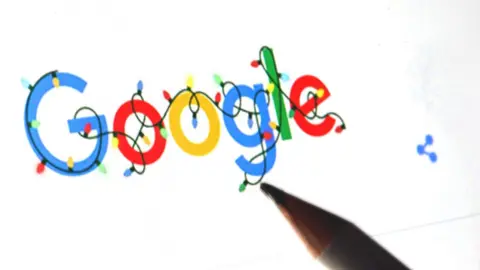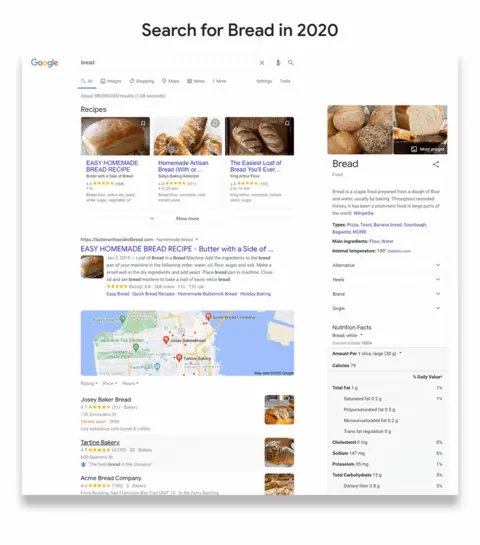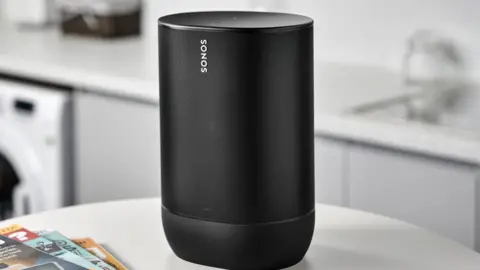Google sued again over anti-competitive search practices
 Getty Images
Getty ImagesGoogle is being sued by 38 US states, accused of trying to make its search engine as dominant inside cars, TVs and speakers as it is in smartphones.
This follows a landmark lawsuit by the US Department of Justice (DoJ) over a similar issue in October.
It is the tech giant's third US government-related lawsuit in two months.
Google said in a blog that redesigning its search engine would "deprive Americans of helpful information".
"We know that scrutiny of big companies is important and we're prepared to answer questions and work through the issues," wrote Google's director of economic policy Adam Cohen.
"But this lawsuit seeks to redesign Search in ways that would deprive Americans of helpful information and hurt businesses' ability to connect directly with customers. We look forward to making that case in court, while remaining focused on delivering a high-quality search experience for our users."
He added that there are many alternatives to Google when looking for relevant information, including Amazon, Expedia and Tripadvisor.
The tech giant's view is that the lawsuit is suggesting that Google Search "should, in fact, be less useful" to consumers.
"When you search for local products and services, we show information that helps you connect with businesses directly and helps them reach more customers," wrote Mr Cohen.
"This lawsuit demands changes to the design of Google Search, requiring us to prominently feature online middlemen in place of direct connections to businesses."
 Google
Google The complaint was filed on Thursday by 38 states and territories with both Democrat and Republican prosecutors, led by Colorado Attorney General Phil Weiser.
"Google's anticompetitive actions have protected its general search monopolies and excluded rivals, depriving consumers of the benefits of competitive choices, forestalling innovation, and undermining new entry or expansion," Mr Weiser explained. "This lawsuit seeks to restore competition."
It is a separate matter to the lawsuit filed on Wednesday in which 10 US states accuse Google of anti-competitive online advertising practices, including an allegation that it made a deal with Facebook to manipulate online advertising auctions.
'Monopolising voice assistants'
In some ways, the latest complaint is similar to the DoJ's lawsuit, which focused on the billions of dollars Google pays each year to ensure its search engine is installed as the default option on browsers and devices like mobile phones.
However, the latest legal complaint goes further to say that the tech giant is using its existing monopolies in search - such as "exclusionary agreements" and its ability to collect "vast amounts of data" - to dominate newer technologies as well.
For instance, the lawsuit claims Google bars devices that use Google Assistant from including competing virtual assistant technology, such as Amazon's Alexa.
 Future Publishing / Getty Images
Future Publishing / Getty Images"Google is preventing competitors in the voice assistant market from reaching consumers through connected cars, which stand to be a significant way the internet is accessed in the near future," said Iowa Attorney General Tom Miller, who also sued Microsoft back in 1998 over antitrust issues.
Smart speaker maker Sonos has publicly complained in the past that Google used its market power unfairly to monopolise the voice assistant market. Sonos only finally decided to support the Google Assistant in 2019.
The coalition is asking the court to halt what it calls Google's illegal conduct and restore a competitive marketplace, as well as removing any unfair advantages the tech giant gained as a result of its practices. It calls for Google's parent Alphabet to be forced to divest some assets and award damages, instead of paying a fine.
"Fines are like kicking gorillas in the shin. We fortunately have remedies that are much broader in scope," said Nebraska Attorney General Doug Peterson.
The states who filed the lawsuit on Thursday are: Colorado, Arizona, Colorado, Iowa, Nebraska, New York, North Carolina, Tennessee, Utah, Alaska, Connecticut, Delaware, Hawaii, Idaho, Illinois, Kansas, Maine, Maryland, Massachusetts, Minnesota, Nevada, New Hampshire, New Jersey, New Mexico, North Dakota, Ohio, Oklahoma, Oregon, Pennsylvania, Rhode Island, South Dakota, Vermont, Virginia, Washington, West Virginia, Wyoming, the District of Columbia, and the territories of Guam and Puerto Rico.
